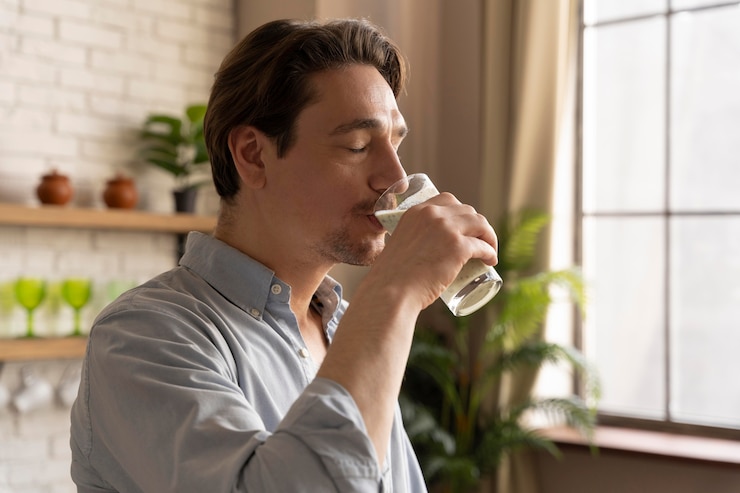आयुर्वेदिक डॉक्टर से प्रश्न पूछें और निःशुल्क या भुगतान मोड में अपनी चिंता की समस्या पर ऑनलाइन परामर्श प्राप्त करें। 2,000 से अधिक अनुभवी डॉक्टर हमारी साइट पर काम करते हैं और आपके प्रश्नों का इंतजार करते हैं और उपयोगकर्ताओं को उनकी स्वास्थ्य समस्याओं को हल करने में प्रतिदिन मदद करते हैं।
Mastering the Art of Drinking Water

Key Takeaways
- Staying hydrated is essential for maintaining overall health, as water is vital for numerous bodily functions.
- Daily water intake varies per individual, influenced by factors such as age, climate, activity level, and diet.
- Ayurvedic practices offer valuable insights into hydration, emphasizing mindful and balanced consumption of water.
- Avoid common hydration mistakes, such as drinking too quickly or consuming large quantities at once, to enhance your water intake strategy.
- Implement practical tips for better hydration, like drinking water at regular intervals and paying attention to your body's signals, to maintain optimal hydration levels.
Water is the essence of life, yet many of us overlook the simple act of drinking it properly. Staying hydrated is more than just quenching your thirst. It plays a crucial role in keeping our bodies functioning smoothly. From supporting digestion to ensuring our skin stays healthy, water is a silent hero in our daily lives.
This article explores how to drink water effectively, blending modern science with ancient Ayurvedic wisdom. We'll discuss best practices for staying hydrated, why timing matters, and how cultural practices like Ayurveda offer insights into water consumption. These facts and insights will guide you toward a healthier, more balanced lifestyle.
So, are you ready to uncover the secrets of proper hydration? Get comfortable, and let's dive into the fascinating world of water and its impact on our well-being.
स्वयं दवा न लें और प्रतीक्षा न करें। अभी डॉक्टर से चैट शुरू करें
How Much Water Do You Need?
Everyone's water needs are a bit different. Generally, health experts suggest drinking about 8 glasses, or 2 liters, of water a day. This is often called the "8x8 rule." Yet, your personal needs can vary based on factors like age, activity level, and climate.
For example, if you exercise a lot or live in a hot area, you might need more water. Drinking enough water helps keep your body in balance. A study by the National Academies of Sciences, Engineering, and Medicine indicates that total daily water intake should be about 3.7 liters for men and 2.7 liters for women, including all beverages and food. This shows the importance of staying hydrated throughout the day.

Ayurvedic Water Practices
Ayurveda, the ancient system of medicine from India, offers unique insights into how we can drink water for better health. This wisdom is both simple and profound. One key practice is to sip water throughout the day rather than gulping it down. This helps our body absorb it more effectively.
In Ayurveda, the temperature of water matters. Drinking warm water is often recommended, as it aids digestion and balances the body's doshas, which are the energies that govern our physical and mental processes. Cold water, on the other hand, can slow down digestion and lead to imbalances.
An Ayurvedic technique involves storing water in a copper vessel. This is believed to purify the water and infuse it with copper ions, which can help boost the immune system and support digestion.
"Water is the driving force of all nature."
- Leonardo da Vinci
Timing is crucial too. Ayurveda suggests drinking water on an empty stomach first thing in the morning. This can help flush out toxins and hydrate the body after a night's rest. Sipping water during meals is also advised, but in moderation. Too much water can dilute digestive juices.
These practices, though rooted in tradition, align with modern understandings of hydration. By embracing them, we might find a more balanced approach to staying hydrated every day.

Common Mistakes in Drinking Water
Many of us think we're doing a good job with hydration, but there are common mistakes when it comes to drinking water. Let's explore a few of these blunders and see how we can avoid them.
One big mistake is waiting until you're thirsty to drink water. Thirst is a sign that you're already dehydrated. Instead, aim to drink water throughout the day to keep your hydration levels steady. Picture it like keeping your car's fuel tank topped up before the warning light comes on. This way, you're always ready to go without any hiccups.
Another misstep is gulping down large amounts of water at once. Our bodies can only process so much at a time. Drinking too much too quickly can lead to a condition known as water intoxication. It's better to take small sips regularly. Think of it as a steady trickle rather than a flash flood.
Temperature plays a part too. Many folks prefer drinking ice-cold water, especially on a hot day. While it might feel refreshing, it can actually slow down digestion. According to Ayurveda, drinking warm or room-temperature water is more beneficial for your system. It helps with digestion and keeps your internal processes running smoothly.
Let's talk about timing as well. Drinking water right before meals can dilute digestive juices, which isn't ideal. It's best to have water about 30 minutes before or after eating. This allows your stomach to do its job without interference.
Finally, relying solely on water for hydration might be an oversight. Foods like fruits and vegetables can also contribute to your daily water intake. Think of watermelon or cucumber, which are both delicious and hydrating.
To sum it up, drinking water might seem simple, but there are nuances to getting it right. As Mahatma Gandhi wisely said,
"There is more to life than increasing its speed."
- Mahatma Gandhi
This can apply to how we drink water too. Taking it slow and steady often wins the race.
Tips for Better Hydration
Drinking water seems simple, right? But how you drink it can make a big difference in how well your body stays hydrated. Start your day with a glass of water to kick off your body's processes. This can help wake you up and get your system moving.
Try to sip water throughout the day rather than drinking a lot at once. Your body absorbs water better in small amounts. Consider drinking warm water, as suggested by Ayurvedic practices, which believe it aids digestion and removes toxins.
Pay attention to your body's signals. Feeling thirsty? That's your body asking for water. Listen to it and drink regularly. Carrying a water bottle can remind you to drink more often, especially if you're busy or on the go.
Incorporate water-rich foods into your diet. Fruits like watermelon and cucumbers are great choices. They help keep you hydrated and are a perfect snack during hot days.
If you're interested in learning more, why not explore how different cultures approach hydration? You might find new habits to adopt. Share your thoughts in the comments or share this article with friends who could use some hydration tips. Let's keep the conversation flowing!
FAQ For Drinking Water
Why is staying hydrated so important?
Staying hydrated is vital because water is essential for numerous bodily functions, including regulating temperature, maintaining joint lubrication, delivering nutrients to cells, and ensuring proper organ function. Dehydration can lead to fatigue, reduced cognitive ability, and other health issues.
How can I determine the right amount of water to drink daily?
The right amount of water depends on several factors, including age, weight, activity level, and climate. A general guideline is to drink about eight 8-ounce glasses of water a day, but individual needs may vary. Listening to your body and adjusting your intake based on thirst and activity is crucial.
What are some Ayurvedic practices for drinking water?
Ayurvedic practices suggest drinking water that is warm or at room temperature, consuming it slowly in small sips, and avoiding drinking large amounts with meals. These practices are believed to support digestion and enhance hydration.
What are some common mistakes people make when drinking water?
Common mistakes include drinking too much water at once, not spacing out water intake throughout the day, consuming very cold water, and relying solely on beverages like coffee or soda for hydration. Correcting these habits can improve hydration.
How can I enhance my hydration routine effectively?
To enhance hydration effectively, carry a reusable water bottle, set reminders to drink water, consume hydrating foods like fruits and vegetables, and adjust your water intake based on physical activity and environmental conditions.
Can my hydration needs change with the seasons?
Yes, hydration needs can change with the seasons. In warmer months, you may need more water to compensate for increased sweating, while in colder months, dry indoor air may increase your hydration needs. Always listen to your body's signals.
Is it possible to drink too much water, and what are the risks?
Yes, it's possible to drink too much water, which can lead to a condition called hyponatremia, where the balance of electrolytes in your body is disrupted. This can cause symptoms ranging from nausea to more severe issues like seizures. It's essential to balance water intake with electrolytes.

